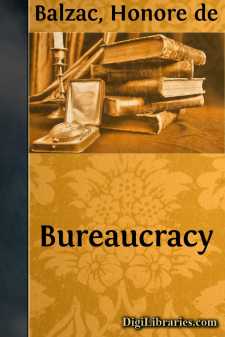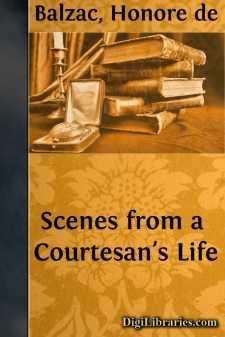Literary Collections
- American 84
- Ancient, Classical & Medieval 14
- Asian 1
- Australian & Oceanian 1
- Canadian 55
- Continental European
- English, Irish, Scottish, Welsh 179
- Essays 160
- General 24
- Letters 46
- Middle Eastern 1
Continental European Books
Sort by:
by:
Honore de Balzac
CHAPTER I. THE RABOURDIN HOUSEHOLD In Paris, where men of thought and study bear a certain likeness to one another, living as they do in a common centre, you must have met with several resembling Monsieur Rabourdin, whose acquaintance we are about to make at a moment when he is head of a bureau in one of our most important ministries. At this period he was forty years old, with gray hair of so pleasing...
more...
by:
Honore de Balzac
GAUDISSART II. To know how to sell, to be able to sell, and to sell. People generally do not suspect how much of the stateliness of Paris is due to these three aspects of the same problem. The brilliant display of shops as rich as the salons of the noblesse before 1789; the splendors of cafes which eclipse, and easily eclipse, the Versailles of our day; the shop-window illusions, new every morning,...
more...
by:
Honore de Balzac
ESTHER HAPPY; OR, HOW A COURTESAN CAN LOVE In 1824, at the last opera ball of the season, several masks were struck by the beauty of a youth who was wandering about the passages and greenroom with the air of a man in search of a woman kept at home by unexpected circumstances. The secret of this behavior, now dilatory and again hurried, is known only to old women and to certain experienced loungers. In...
more...
INTRODUCTION The highest living authority on French Literature—Professor George Saintsbury—has said: "The Cent Nouvelles is undoubtedly the first work of literary prose in French, and the first, moreover, of a long and most remarkable series of literary works in which French writers may challenge all comers with the certainty of victory. The short prose tale of a comic character is the one...
more...
by:
Honore de Balzac
THE ATHEIST'S MASS Bianchon, a physician to whom science owes a fine system of theoretical physiology, and who, while still young, made himself a celebrity in the medical school of Paris, that central luminary to which European doctors do homage, practised surgery for a long time before he took up medicine. His earliest studies were guided by one of the greatest of French surgeons, the illustrious...
more...
by:
Honore de Balzac
THE MESSAGE I have always longed to tell a simple and true story, which should strike terror into two young lovers, and drive them to take refuge each in the other's heart, as two children cling together at the sight of a snake by a woodside. At the risk of spoiling my story and of being taken for a coxcomb, I state my intention at the outset. I myself played a part in this almost commonplace...
more...
by:
Honore de Balzac
PROLOGUE Certain persons have interrogated the author as to why there was such a demand for these tales that no year passes without his giving an instalment of them, and why he has lately taken to writing commas mixed up with bad syllables, at which the ladies publicly knit their brows, and have put to him other questions of a like character. The author declares that these treacherous words, cast like...
more...
by:
Kuno Francke
The last two volumes of this comprehensive publication are devoted to the living, the writers of the present who sow the seed from which shall grow the future of German letters. But who can speak of prophecy or prevision, at a moment when all who call themselves German are compelled to fight for their existence, and the future of German nationality as well as of German culture is hidden by the smoke of...
more...
by:
Honore de Balzac
INTRODUCTION In hardly any of his books, with the possible exception of Eugenie Grandet, does Balzac seem to have taken a greater interest than in Le Medecin de Campagne; and the fact of this interest, together with the merit and intensity of the book in each case, is, let it be repeated, a valid argument against those who would have it that there was something essentially sinister both in his genius...
more...
by:
Honore de Balzac
MADAME FIRMIANI Many tales, either rich in situations or made dramatic by some of the innumerable tricks of chance, carry with them their own particular setting, which can be rendered artistically or simply by those who narrate them, without their subjects losing any, even the least of their charms. But there are some incidents in human experience to which the heart alone is able to give life; there...
more...











